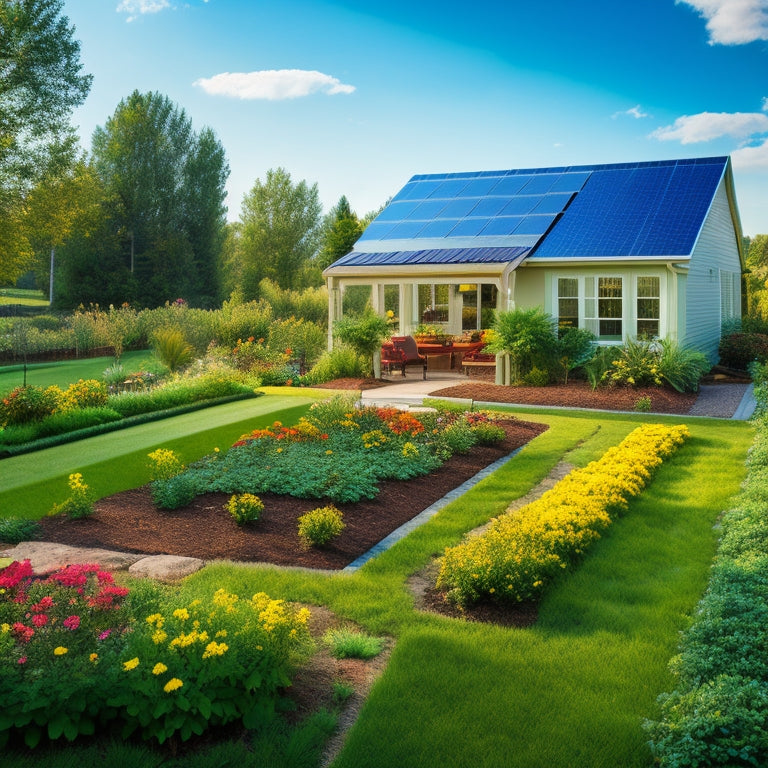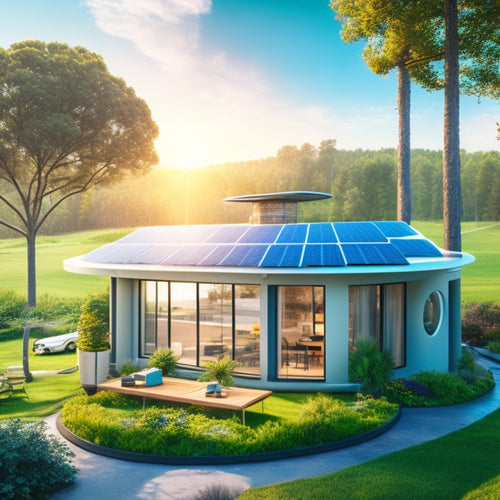
Why Solar-Powered Irrigation Revolutionizes Home Water Management?
Share
By adopting solar-powered irrigation, you're revolutionizing your home water management by utilizing renewable energy, greatly reducing energy consumption, and promoting sustainable practices. This innovative approach optimizes water flow, eliminating waste and ensuring timely irrigation, while smart sensors and automated flow control monitor soil moisture and environmental factors. Not only will you enjoy reduced energy bills, but you'll also future-proof your home against environmental regulations and consumer preferences. As you investigate the benefits of solar-powered irrigation further, you'll uncover a wealth of opportunities to maximize water efficiency, enhance crop yields, and contribute to a more environmentally conscious community.
Key Takeaways
- Solar-powered irrigation reduces energy consumption and operating costs, making it an environmentally friendly and cost-effective solution for home water management.
- Advanced solar technology and government incentives make solar-powered irrigation a viable option for homeowners, reducing reliance on traditional energy sources.
- Efficient pressure management and automated flow control in solar-powered irrigation systems optimize water flow, reducing waste and conserving water resources effectively.
- Solar-powered irrigation promotes sustainable agricultural practices, enhancing crop yield and water efficiency while protecting local ecosystems and wildlife habitats.
- With solar-powered irrigation, homeowners can enjoy significant long-term savings on energy bills, increased property value, and a reduced carbon footprint.
Harnessing Renewable Energy Sources
Many countries are increasingly reliant on renewable energy sources to power their irrigation systems, and for good reason: renewable energy can greatly reduce greenhouse gas emissions and operating costs.
As you consider utilizing renewable energy sources for your irrigation system, you'll find that solar energy benefits are particularly appealing. By shifting to renewable energy, you can future-proof your business and adapt to regulations and consumer preferences.
With renewable technology advancements, solar panels have become more efficient and affordable, making them a viable option for homeowners. By switching to solar power, you'll not only reduce your carbon footprint but also lower your energy bills.
Plus, with government incentives and net metering, you can even sell excess energy back to the grid.
Efficient Water Distribution Systems
As you design an efficient water distribution system for your solar-powered irrigation project, you'll need to manage water pressure effectively to prevent pipe damage and optimize flow rates.
By incorporating hybrid electric solutions, you can improve fuel efficiency and reduce emissions in your irrigation system electric vehicle infrastructure.
Automated flow control systems can help you achieve this by regulating water flow based on crop requirements and soil moisture levels.
Additionally, incorporating leak detection systems will enable you to identify and address water losses quickly, ensuring your irrigation system operates at peak efficiency.
Water Pressure Management
Throughout your solar-powered irrigation system, water pressure plays a vital role in guaranteeing efficient water distribution. You need to regulate pressure to prevent damage to pipes, fittings, and pumps.
Pressure regulation is essential to maintain ideal water flow, reducing energy consumption and increasing the system's overall efficiency. When water pressure is too high, it can lead to wastage, erosion, and damage to your surroundings. Conversely, low pressure can result in inadequate water supply to your plants.
By implementing an efficient pressure management system, you can optimize water flow, reduce energy consumption, and guarantee your plants receive the right amount of water at the right time.
Additionally, incorporating renewable energy solutions can further enhance the sustainability of your irrigation system, reducing reliance on fossil fuels and minimizing your carbon footprint.
This balance is key to achieving a sustainable and efficient irrigation system.
Automated Flow Control
In your quest for efficient water distribution, you'll find that automated flow control is an essential component of a well-designed solar-powered irrigation system. This feature allows you to regulate water flow to different areas of your yard or garden, guaranteeing each zone receives the right amount of water.
Smart sensors continuously monitor soil moisture levels, temperature, and other factors, adjusting water flow accordingly. With the ability to utilize renewable energy sources, you can further reduce your carbon footprint and reliance on traditional energy sources.
Through a user-friendly interface, you can program and customize your irrigation schedule, adjusting it as needed to accommodate changing weather conditions or plant growth. This level of control guarantees your plants receive exactly what they need, when they need it, reducing waste and conserving this precious resource.
Leak Detection Systems
With automated flow control in place, you've taken a significant step towards efficient water distribution.
Now, it's time to take it to the next level with leak detection systems. These systems employ smart sensors to monitor your irrigation system in real-time, detecting even the smallest leaks or issues.
By integrating renewable energy sources, like solar power, into your irrigation system, you can reduce your carbon footprint and lower operational costs renewable energy integration.
This allows you to:
- Identify and address problems quickly, reducing water waste and saving you money
- Receive notifications and alerts in real-time, giving you complete control over your system
- Optimize your irrigation schedule and adjust to changing weather conditions
- Extend the lifespan of your equipment and reduce maintenance costs
Reduced Energy Consumption Benefits
You'll be pleased to know that solar-powered irrigation greatly reduces energy consumption, and this has numerous benefits for your wallet and the environment.
By utilizing the power of the sun, you can greatly decrease your reliance on traditional energy sources, resulting in lower electricity bills. This energy efficiency also translates to a reduced carbon footprint, making solar-powered irrigation a sustainable solution for environmentally conscious homeowners.
In addition, solar-powered irrigation systems require minimal maintenance, reducing the need for frequent repairs and replacements. This not only saves you time and money but also guarantees a continuous supply of water for your garden or lawn, promoting healthy plant growth and a beautiful outdoor space.
Optimized Crop Yields Guaranteed
You'll reap the benefits of solar-powered irrigation through higher water efficiency, which guarantees that every drop counts towards nourishing your crops.
With precise moisture control, you'll be able to tailor water distribution to the specific needs of each crop, eliminating waste and reducing the risk of overwatering.
Higher Water Efficiency
As farmers and agricultural professionals, you've likely experienced the challenges of optimizing crop yields while managing water resources efficiently.
With solar-powered irrigation, you can overcome these challenges and achieve higher water efficiency. This innovative technology helps you make the most of available water resources, reducing waste and ensuring that every drop counts.
Some key benefits of solar-powered irrigation for higher water efficiency include:
- Reducing water scarcity by using available water resources more effectively
- Implementing sustainable agriculture practices that promote soil health and climate resilience
- Leveraging farming innovations to optimize resource allocation and reduce waste
- Enhancing drought management and crop sustainability through precise water management
Precise Moisture Control
Maximizing crop yields relies heavily on maintaining a delicate balance of moisture levels, which is where solar-powered irrigation's precise moisture control comes into play.
You can guarantee ideal soil moisture levels by leveraging advanced irrigation scheduling, which takes into account real-time climate adaptation data. This results in healthier crops, reduced water waste, and improved water quality.
By integrating solar-powered irrigation into your existing system, you can seamlessly adopt sustainable practices that enhance yields while minimizing your environmental footprint.
With precise moisture control, you'll enjoy increased crop resilience, reduced fertilizer usage, and a significant reduction in water consumption.
Environmental Impact Minimization
By adopting solar-powered irrigation systems, farmers can considerably reduce their environmental footprint.
You'll be contributing to sustainable agriculture and ecosystem preservation by minimizing your reliance on fossil fuels. Here's how:
-
Reduce greenhouse gas emissions: Solar power generates clean energy, decreasing your carbon footprint and mitigating climate change.
-
Conserve water: Solar-powered irrigation systems optimize water usage, reducing waste and preserving this precious resource.
-
Protect ecosystems: By reducing energy consumption, you'll also minimize the impact of irrigation on local ecosystems and wildlife habitats.
- Promote eco-friendly practices: Solar-powered irrigation sets a precedent for environmentally responsible farming practices, inspiring others to follow suit.
Cost Savings for Homeowners
Reducing your energy expenses is a significant advantage of adopting solar-powered irrigation systems, and homeowners stand to benefit greatly from this cost-effective solution.
While there's an initial investment, the long-term savings on energy bills will more than make up for it. Additionally, solar-powered systems require minimal maintenance costs, freeing up your resources for other priorities.
You may also be eligible for financial incentives, such as tax deductions and insurance benefits, which can further offset the initial cost.
By investing in solar-powered irrigation, you're not only increasing your energy independence but also enhancing your property value.
Plus, scalable systems can grow with your needs, making it a wise investment for the future.
Increased Water Conservation Efforts
As you reap the financial benefits of solar-powered irrigation, you'll also contribute to a more sustainable future through increased water conservation efforts.
By integrating solar-powered irrigation into your home water management, you'll reduce your reliance on municipal water supplies, minimizing the strain on local resources. This approach promotes:
-
Rainwater harvesting: Collecting and storing rainwater for non-potable uses, reducing your water bill and dependence on municipal supplies.
-
Drought resilience: Ensuring your garden or crops thrive even during dry spells, thanks to the consistent water supply provided by solar-powered irrigation.
-
Irrigation scheduling optimization: Leveraging technology to optimize irrigation schedules, reducing water waste and promoting soil health.
- Community engagement and education: Serving as a model for sustainable practices, inspiring others to adopt eco-friendly solutions and promoting a culture of water conservation.
Frequently Asked Questions
Can Solar-Powered Irrigation Systems Be Used for Residential Areas?
You can definitely use solar-powered irrigation systems in residential areas, enjoying residential benefits like reduced noise pollution and increased property value, while reaping energy savings of up to 70% on your water management costs.
Are There Any Government Incentives for Solar-Powered Irrigation Adoption?
You're wondering if Uncle Sam will give you a high-five for going solar? Yes, you'll find federal grants and tax credits waiting in the wings, making your eco-friendly irrigation dreams a financially savvy reality, too!
How Do Solar-Powered Irrigation Systems Handle Low Sunlight Conditions?
When dealing with low sunlight conditions, you'll find that solar-powered irrigation systems adapt through advanced sunlight adaptation technologies, ensuring consistent water supply, while maintaining ideal solar efficiency, so you can relax, knowing your garden's well-watered, even on cloudy days.
Can Existing Irrigation Systems Be Converted to Solar-Powered Ones?
You can retrofit your existing irrigation system to solar power, like a California vineyard that converted its 100-acre system, increasing energy efficiency by 70%. System conversion requires a thorough assessment, but it's a viable option for maximizing water management freedom.
Are Solar-Powered Irrigation Systems Resistant to Waterborne Diseases?
You'll find that solar-powered irrigation systems greatly reduce disease transmission by minimizing water stagnation, which enhances system efficiency and creates a healthier environment, allowing you to enjoy the freedom of a disease-free garden or yard.
Related Posts
-

Green Deck Options: Earth-Conscious Choices for Your Home
You're looking for a deck that not only enhances your home's exterior but also aligns with your eco-friendly values. ...
-

Gamify Your Home's Energy Generation and Savings
You're taking the next step in optimizing your home's energy generation and savings by utilizing the power of gamific...
-

What Air Purifiers Save Energy in Work Areas?
You can cut energy costs and reduce your carbon footprint by choosing air purifiers designed with energy efficiency i...


